Ditapis dengan

Wangsit (paWANG Soal sulIT) UTBK SNBT 2026
Fitur apa yang kamu dapatkan? Informasi terbaru UTBK Seleksi Nasional Berdasarkan Tes (SNBT) Berisi informasi terbaru Seleksi Nasional Berdasarkan Tes (SNBT), syarat pendaftaran, ketentuan pemilihan program studi, komponen materi ujian SNBT, kisi-kisi soal SNBT, strategi lolos masuk PTN favorit, dan panduan belajar efektif SNBT. Bedah materi dan soal SNBT Berisi pendalaman materi, contoh …
- Edisi
- Cet. 4
- ISBN/ISSN
- 9786020531526
- Deskripsi Fisik
- xxiv, 616 hlm; 19 x 26 cm
- Judul Seri
- -
- No. Panggil
- 371.27 TIM w

Kalahkan Diabesitas (Diabetes & Obesitas) dengan Healthy Lifestyle & Intermit…
Anda sudah tahu tentang diabetes, juga mengenal obesitas. WHO menyebutkan, orang gemuk di dunia sudah mencapai satu miliaran, penyandang diabetes melebihi lima ratus juta. Bahkan, separuh populasi dunia mengalami resistensi insulin atau prediabetes. Jika bobot tubuh kelewat batas, diabetes pun datang menghampiri anda. Dua urusan yang pelik ini - diabetes dan obesitas, atau diabesitas - pasti me…
- Edisi
- Ed. 1 Cet. 1
- ISBN/ISSN
- 9786236822913
- Deskripsi Fisik
- vi, 154 hlm; 15 x 21 cm
- Judul Seri
- -
- No. Panggil
- 616.462 HAN k
As Long as the Lemon Trees Grow
Akibat perang Suriah, Salama kehilangan ibunya, ayah dan Hamza. Dia pun harus menjaga Layla, kakak iparnya yang sedang hamil. Hamza berpesan agar Salama menjaga Layla dan calon bayinya. Satu-satunya cara menjaga Layla dari perang adalah mengungsi ke Eropa, tapi setiap kali melihat para korban perang, rasa bersalah menikam Salama. Haruskah dia pergi dari Suriah, ketika bangsanya bergelimpangan a…
- Edisi
- Ed. 2 Cet. 2
- ISBN/ISSN
- 9786024413903
- Deskripsi Fisik
- 512 hlm; 13 x 20,5 cm
- Judul Seri
- -
- No. Panggil
- 813 KAT a
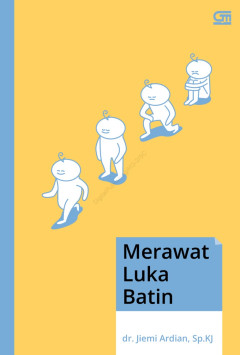
Merawat Luka Batin
"You are what you think," begitu kata banyak orang. Padahal, ketika saya berpikir saya kaya, uang dalam rekening saya tidak otomatis bertambah. Akan lebih tepat jika kutipan ini sedikit diubah menjadi "You are how you think", karena perasaan dan diri kita bergantung pada bagaimana cara kita berpikir.
- Edisi
- Cet. 12
- ISBN/ISSN
- 9786020661520
- Deskripsi Fisik
- xiv, 314 hlm; 13,5 x 20 cm
- Judul Seri
- -
- No. Panggil
- 155.9042 JIE m
Fisiologi Hewan
Buku Fisiologi Hewan edisi revisi ini diterbitkan dalam rangka meningkatkan kualitas isinya agar dapat memenuhi kebutuhan para penggunanya. Buku ini merupakan pegangan bagi mahasiswa jurusan Biologi, Peternakan/Perikanan, dan Kedokteran Hewan, yang sedang mempelajari fisiologi hewan. Buku ini mengkaji proses-proses fisiologis dalam tubuh hewan secara sederhana, komunikatif, dan dilengkapi denga…
- Edisi
- Ed. Revisi Cet. 3
- ISBN/ISSN
- 9789792162714
- Deskripsi Fisik
- 392 hlm; 15,5 x 23 cm
- Judul Seri
- -
- No. Panggil
- 571.1 WIW f
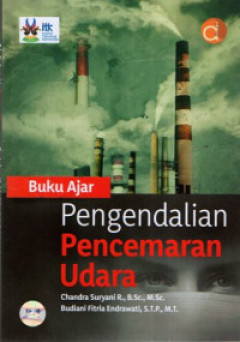
Pengendalian Pencemaran Udara
Pencemaran udara merupakan permasalahan yang dialami oleh semua negara, terutama pada negara-negara yang masih bergantung pada industri. Karena pencemaran udara ini tidak terelakkan, maka harus dilakukan beberapa konsep untuk mencegah pencemaran udara ke atmosfer. Konsep pencegahan pencemaran udara ini secara umum dapat dilakukan dengan cara mengurangi dari sumber, maupun mengendalikan emisi bu…
- Edisi
- Cet. 1
- ISBN/ISSN
- 9786230238192
- Deskripsi Fisik
- x, 63 hlm; 14 x 20 cm
- Judul Seri
- -
- No. Panggil
- 363.73 CHA p
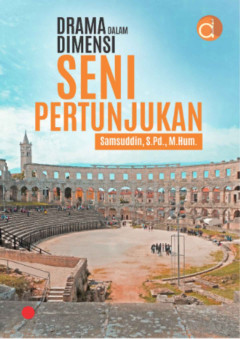
Drama dalam Dimensi Seni Pertunjukan
Buku ini membahas drama dalam dimensi seni pertunjukan. Terkait dengan hal itu, ada dua aspek yang disajikan, yaitu: (1) aspek tata usaha, dan (2) aspek tata kesenian. Kedua aspek tersebut didukung oleh deskripsi indikator yang dapat digunakan untuk telaah drama dalam dimensi seni pertunjukan.
- Edisi
- Cet. 1
- ISBN/ISSN
- 9786230256745
- Deskripsi Fisik
- xii, 75 hlm; 14 x 20 cm
- Judul Seri
- -
- No. Panggil
- 792.9 SAM d
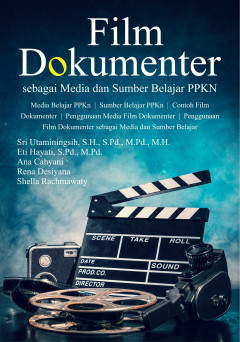
Film Dokumenter
Film dokumenter merupakan film yang menceritakan kembali sebuah kejadian atas realita menggunakan fakta dan data. Terfokus pada subjek-subjek seperti sejarah, ilmu pengetahuan, sosial dan lingkungan, film ini bertujuan dasar untuk memberikan pencerahan informasi, pendidikan, melakukan persuasi, dan memberikan wawasan. Film dokumenter juga memiliki berbagai macam jenis.
- Edisi
- Cet. 1
- ISBN/ISSN
- 9786230225345
- Deskripsi Fisik
- viii, 40 hlm; 14 x 20 cm
- Judul Seri
- -
- No. Panggil
- 791.437 SRI f

Mada
Kisah cinta beda masa yang terjadi di atas tanah Majapahit. Dimulai dari pertemuan tak sengaja di perpustakaan, Gendhis tiba-tiba tertarik ke masa lalu pada zaman kerajaan Majapahit. Sejauh apa pun Gendhis berlari, Gendhis tetap masuk ke dalam dunia yang terasa aneh baginya. Majapahit, Gajah Mada, Hayam Wuruk, nama-nama tersebut terus berputar di pikiran dan penglihatannya. Hingga akhirnya, i…
- Edisi
- Cet. 11
- ISBN/ISSN
- 9786235953601
- Deskripsi Fisik
- 428 hlm; 14 x 20 cm
- Judul Seri
- -
- No. Panggil
- 899.2213 GIG m

Solfegio
Kemampuan membaca dan mendengar adalah modal utama untuk mempelajari teori musik. Kedua kemampuan ini saling terkait dengan materi pembelajaran musik lainnya karena sifatnya saling mendukung. Bermain alat musik akan sulit tanpa mendengar, selain itu kemampuan membaca berguna berkomunikasi, memahami, dan merekam setiap simbol dalam bentuk notasi musik. Setiap bunyi yang tertulis harus dituliskan…
- Edisi
- Ed. 1 Cet. 1
- ISBN/ISSN
- 9786239765729
- Deskripsi Fisik
- viii, 60 hlm; 17 x 24 cm
- Judul Seri
- -
- No. Panggil
- 780.7 RIY s

Pengelolaan Limbah
Buku yang berjudul "Pengelolaan Limbah: Definisi Limbah, Klasifikasi dan Tahapan Pengelolaannya" ini terdiri dari 7 bab. Bab pertama menjelaskan sejarah limbah dan peraturan nasional terkait limbah dan pengelolaannya. Bab kedua menjelaskan terkait definisi dan klasifikasi limbah. Bab ketiga menjelaskan dampak limbah terhadap lingkungan dan kesehatan manusia. Bab keempat dan seterusnya menjelask…
- Edisi
- Ed. 1 Cet. 1
- ISBN/ISSN
- 9786233761284
- Deskripsi Fisik
- xvi, 70 hlm; 17 x 24 cm
- Judul Seri
- -
- No. Panggil
- 628.4 MAY p

Indonesia Indigenous Culinary
Buku ini mengungkap rahasia di balik kelezatan makanan tradisional Indonesia yang kaya akan bumbu dan rempah. Setiap daerah di Indonesia memiliki budaya kuliner yang unik, mulai dari yang sangat dikenal hingga yang jarang dikenal oleh masyarakat luas. Buku ini menjelaskan perbedaan antara bumbu dan rempah, serta bagaimana kombinasi dan penggunaannya dapat menciptakan hidangan yang autentik dan …
- Edisi
- Ed. 1 Cet. 1
- ISBN/ISSN
- 9786239897383
- Deskripsi Fisik
- x, 86 hlm; 17 x 24 cm
- Judul Seri
- -
- No. Panggil
- 641.59598 SAR i
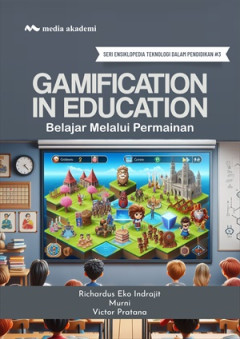
Gamification in Education
Buku "Gamification in Education: Belajar Melalui Permainan" menyediakan panduan komprehensif tentang penerapan gamification dalam pendidikan, dibagi menjadi lima bab yang mencakup pengenalan gamification, teori dan konsep dasarnya, aplikasi praktis dalam kelas termasuk pemanfaatan teknologi, studi kasus spesifik dalam berbagai mata pelajaran serta di Indonesia, dan menutup dengan eksplorasi tre…
- Edisi
- Ed. 1 Cet. 1
- ISBN/ISSN
- 9786235334998
- Deskripsi Fisik
- x, 64 hlm; 14 x 20,5 cm
- Judul Seri
- Seri Ensiklopedia Teknologi dalam Pendidikan #3
- No. Panggil
- 371.337 RIC g
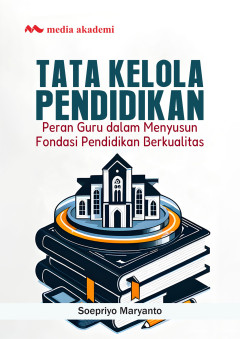
Tata Kelola Pendidikan
Buku 'Tata Kelola Pendidikan dalam Menyusun Fondasi Pendidikan Berkualitas' menyajikan pandangan mendalam tentang pengembangan pendidikan di Indonesia. Dengan fokus pada inovasi pengajaran, manajemen sekolah, dan adaptasi terhadap tantangan masa kini, buku ini memberikan wawasan bagi guru, administrator, dan pemangku kepentingan pendidikan. Melalui lima bab, pembaca diajak menjelajahi praktik t…
- Edisi
- Ed. 1 Cet. 1
- ISBN/ISSN
- 9786238562565
- Deskripsi Fisik
- x, 76 hlm; 14 x 20,5 cm
- Judul Seri
- -
- No. Panggil
- 379.15 SOE t

Gesture: Mengungkap Makna di Balik Bahasa Tubuh Orang Lain dari Mikroekspresi…
Buku GESTURE ini mengajak kita untuk melatih kemampuan membaca pesan dari bahasa tubuh lawan bicara. Di dalam buku memuat teori komunikasi nonverbal berpadu dengan keilmuan psikologi pengembangan diri. Kita juga diajak untuk mempelajari perilaku-perilaku lawan bicara yang bisa diamati dan dipelajari secara langsung, termasuk mendeteksi lawan bicara yang sedang berbohong.
- Edisi
- -
- ISBN/ISSN
- 9786025254918
- Deskripsi Fisik
- 210 hlm; 14 x 20
- Judul Seri
- -
- No. Panggil
- 302.222 ZAK g

Secangkir Kopi dan Penemuan Obat Diabetes
Buku ini menjadi sarana berbagi hal-hal praktis untuk melaksanakan riset dinamika molekul guna menyediakan target virtual untuk penemuan dan rancangan obat berbasis struktur. Buku ini disampaikan secara naratif sebagai komplemen dari publikasi-publikasi ilmiah yang terkait serta sebagai sarana menyampaikan berbagai faktor ekstrinsik yang kurang tepat untuk dipublikasikan di jurnal ilmiah. Buku …
- Edisi
- Cet. 1
- ISBN/ISSN
- 9786236103241
- Deskripsi Fisik
- xvi, 109 hlm; 15,5 x 23 cm
- Judul Seri
- -
- No. Panggil
- 610.1 ENA s
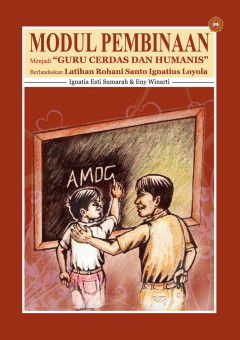
Modul Pembinaan Menjadi "Guru Cerdas dan Humanis"
Modul pembinaan yang disusun oleh Sdri. Ignatia Esti Sumarah dan Eny Winarti ini ingin menyumbangkan salah satu cara membantu calon guru SD agar berkembang menjadi guru yang cerdas dan humanis. Secara khusus modul ini memilih cara membantu calon guru yang cerdas dan humanis dengan pendekatan Latihan Rohani St. Ignatius Loyola yang menjadi semangat Universitas Sanata Dharma, di mana keduanya ber…
- Edisi
- Cet. 1
- ISBN/ISSN
- 9786029187823
- Deskripsi Fisik
- iv, 58 hlm; 14,8 x 21 cm
- Judul Seri
- -
- No. Panggil
- 371.12 IGN m
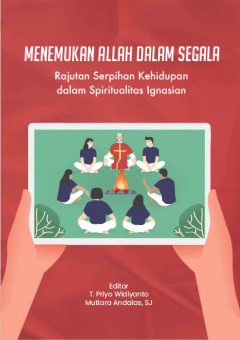
Menemukan Allah dalam Segala
Buku Menemukan Allah dalam Segala: Rajutan Serpihan Kehidupan dalam Spiritualitas Ignasian, mengisahkan dinamika kehidupan para penulis, yang tidak selamanya menggembirakan. Suatu saat, seseorang bisa menikmati kehidupan yang serba menggembirakan, dalam kegembiraan kehidupannya, seseorang dengan mudah berucap syukur kepada Tuhan, karena Tuhan telah melimpahkan anugerahNya. Tuhan begitu dekat de…
- Edisi
- Cet. 1
- ISBN/ISSN
- 9786236103210
- Deskripsi Fisik
- xvi, 220 hlm; 14,8 x 21 cm
- Judul Seri
- -
- No. Panggil
- 282 MUT m

Thus Spoke Zarathustra
Nietzsche was one of the most revolutionary thinkers in Western philosophy, and Thus Spoke Zarathustra remains his most influential work. It describes how the ancient Persian prophet Zarathustra descends from his solitude in the mountains to tell the world that God is dead and that the Superman, the human embodiment of divinity, is his successor. With blazing intensity, Nietzsche argues that th…
- Edisi
- Cet. 1
- ISBN/ISSN
- 0140441182
- Deskripsi Fisik
- 352 hlm; 13 x 20 cm
- Judul Seri
- -
- No. Panggil
- 193 NIE t
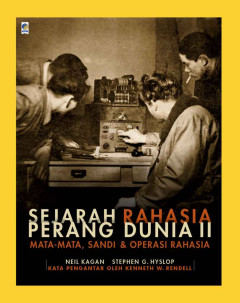
Sejarah Rahasia Perang Dunia II
"Pada masa perang, kebenaran amat berharga sehingga harus selalu didampingi pengawal berupa dusta."~Winston Churchill~ - Enam bab yang mengungkap sejarah rahasia konflik terbesar di dunia, mengisahkan para mata-mata, pemecah sandi, penipuan, dan pasukan rahasia di balik perang. - Menampilkan lebih daripada 700 artefak langka, pesan bersandi, peta rahasia, dan foto yang menunjukkan perang raha…
- Edisi
- Cet. 1
- ISBN/ISSN
- 9786231341853
- Deskripsi Fisik
- 352 hlm; 20,9 x 25,6 cm
- Judul Seri
- -
- No. Panggil
- 940.54 KAG s
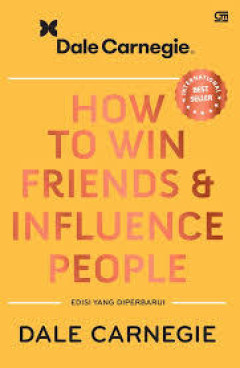
How to Win Friends & Influence People
Anda bisa mengejar pekerjaan yang anda inginkan... dan mendapatkannya! Anda bisa memiliki pekerjaan idaman... dan meningkatkannya! Anda bisa menghadapi situasi apa pun... dan memaksimalkannya! Nasihat-nasihat Dale Carnegie yang teruji waktu telah membawa tak terhitung banyaknya orang mendaki tangga kesuksesan dalam kehidupan pribadi dan bisnis. Salah satu buku terlaris sepanjang masa yang me…
- Edisi
- Cet. 13
- ISBN/ISSN
- 9786020671123
- Deskripsi Fisik
- xxx, 274 hlm; 15 x 23 cm
- Judul Seri
- -
- No. Panggil
- 158.2 CAR h

Kemarin, Hari Ini, dan Selamanya: Sebuah Album dari Proses Sore
Ingin mengutarakan seluruh perasaan untuk kru dan pemain yang menaruh segenap hatinya pada Sore. Isi dari buku ini adalah wajah-wajah yang akan kekal abadi. Selamanya, setiap kali mengunjungi halaman demi halaman buku ini, merekalah yang menjadikan Sore ada. Buku ini adalah tribute untuk kru dan pemain yang kami sayangi.
- Edisi
- Cet. 1
- ISBN/ISSN
- 9786231344359
- Deskripsi Fisik
- vii, 165 hlm; 15 x 20 cm
- Judul Seri
- -
- No. Panggil
- 791.437 YAN k

Mengungkap Kunci Rahasia Price Action untuk Keuntungan Maksimal
Buku ini adalah panduan praktis bagi para pelaku pasar yang tertarik pada analisis teknikal dalam berbagai instrumen keuangan, seperti saham, forex, emas, indeks, dan mata uang kripto. Dengan menggunakan 115 chart sebagai ilustrasi, pembaca diberikan contoh konkret tentang penerapan prinsip-prinsip analisis teknikal dalam situasi nyata. Salah satu fitur menariknya adalah pendekatan yang tidak b…
- Edisi
- Cet. 2
- ISBN/ISSN
- 9786230418921
- Deskripsi Fisik
- 220 hlm; 14 x 21 cm
- Judul Seri
- -
- No. Panggil
- 332.6322 ANT m

Bumi Manusia
Buku ini bercerita tentang perjalanan seorang tokoh bernama Minke. Minke adalah salah satu anak pribumi yang sekolah di HBS. Pada masa itu, yang dapat masuk ke sekolah HBS adalah orang-orang keturunan Eropa. Minke adalah seorang pribumi yang pandai, ia sangat pandai menulis. Tulisannya bisa membuat orang sampai terkagum-kagum dan dimuat di berbagai Koran Belanda pada saat itu. Hanya saja sebaga…
- Edisi
- Cet. 38
- ISBN/ISSN
- 9786231066329
- Deskripsi Fisik
- x, 550 hlm; 13,5 x 20 cm
- Judul Seri
- -
- No. Panggil
- 899.2213 PRA b
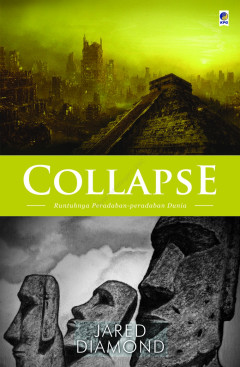
Collapse
Ratusan peradaban telah bangkit dan runtuh sepanjang sejarah manusia. Setelah membahas bangkitnya peradaban dalam Guns, Germs & Steel, Jared Diamond melanjutkan dengan membahas keruntuhan berbagai peradaban masa lalu dan masa kini dalam Collapse.
- Edisi
- Cet. 8
- ISBN/ISSN
- 9786024247263
- Deskripsi Fisik
- xii, 734 hlm; 15 x 23 cm
- Judul Seri
- -
- No. Panggil
- 304.2 DIA c

Ada Kalanya
Terkadang kamu berubah karena ambisi. Terkadang kamu bertahan karena tak ingin kehilangan. Terkadang kamu mengejar ilusi karena sebuah penolakan.
- Edisi
- Cet. 2
- ISBN/ISSN
- 9786020530116
- Deskripsi Fisik
- vi, 138 hlm; 13 x 19 cm
- Judul Seri
- -
- No. Panggil
- 158.1 ADI a

Bahagia Tanpa Tapi
Tak perlu sempurna untuk meraih kehidupan yang diidamkan. Bahagia tanpa tapi... mungkinkah? Hidup dalam masyarakat yang menetapkan standar tertentu sering menempatkan kita dalam posisi tak nyaman atau sulit. Baik dalam lingkup keluarga, sekolah, kerja, maupun pernikahan.
- Edisi
- Cet. 2
- ISBN/ISSN
- 9786020671574
- Deskripsi Fisik
- xiv, 222 hlm; 13,5 x 20 cm
- Judul Seri
- -
- No. Panggil
- 158.1 JEO b

Kontemplasi Untuk Mendapatkan Cinta: Pengalaman-pengalaman Latihan Rohani St…
Buku menemukan Allah dalam Segala: Rajutan Serpihan Kehidupan Dalam Spiritualitas Ignasian, mengisahkan dinamika kehidupan para penulis, yang tidak selamanya menggembirakan. Suatu saat, seseorang bisa menikmati kehidupan yang serba menggembirakan, dalam kegembiraan kehidupannya, seorang dengan mudah berucap syukur kepada Tuhan, karena Tuhan telah.
- Edisi
- -
- ISBN/ISSN
- 9786236103227
- Deskripsi Fisik
- xx + 215 hlm; 14,8 x 21 cm
- Judul Seri
- -
- No. Panggil
- 248.4 MUT k

Antarmuka Mekatronika: Integrasi Teori dan Praktik dengan OP AMP MOSFET, dan …
Buku Antarmuka Mekatronika hadir sebagai panduan komprehensif yang membahas konsep, prinsip, dan implementasi antarmuka dalam sistem mekatronika modern. Buku ini dirancang untuk memenuhi kebutuhan pembaca dari berbagai latar belakang, mulai dari mahasiswa teknik, dosen, insinyur, hingga penggemar elektronika dan otomasi yang ingin memahami bagaimana perangkat keras dan perangkat lunak dapat sal…
- Edisi
- -
- ISBN/ISSN
- 9786231431394
- Deskripsi Fisik
- xv + 157 hlm; 15,5 x 23 cm
- Judul Seri
- -
- No. Panggil
- 621.381 AGU a

Kesetiakawanan di Era Digital Dalam Perspektif Pendidikan Integral Y.B. Mangu…
Filsafat dikenal sebagai ilmu tertua dan sering disebut sebagai induk dari segala ilmu (mater scientiarum). Namun demikian, banyak masyarakat Indonesia masih jarang membahasa filsafat dalam kehidupan sehari-hari.
- Edisi
- -
- ISBN/ISSN
- 9786231431011
- Deskripsi Fisik
- viii + 87 hlm; 15,5 x 23 cm
- Judul Seri
- -
- No. Panggil
- 370.1 CBM k
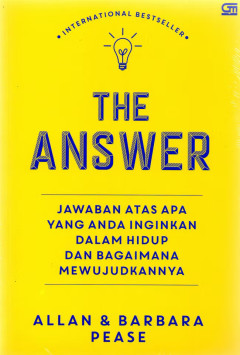
The Answer
Allan dan Barbara Pease menemukan penelitian baru mengenai otak yang menunjukkan bagaimana anda bisa memprogram ulang pola pikir dan melihat peluang, bukan kesulitan. Mereka berbagi pengalaman pribadi dengan jujur dan penuh humor, serta menunjukkan cara menciptakan hidup yang anda inginkan.
- Edisi
- Cet. 10
- ISBN/ISSN
- 9786020611853
- Deskripsi Fisik
- xiv, 362 hlm; 13,5 x 20 cm
- Judul Seri
- -
- No. Panggil
- 153.8 ALL t
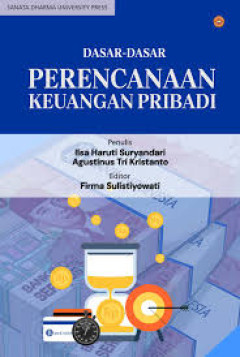
Dasar-Dasar Perencanaan Keuangan Pribadi
Buku ini memberikan panduan praktis tentang perencanaan keuangan pribadi, dilengkapi dengan langkah-lngkah konkret yang dapat langsung diterapkan. Diharapkan pembaca dapat membuat keputusuan finansial yang lebih baik, merencanakan masa depan finansial mereka, dan mencapai kesejahteraan yang lebih tinggi.
- Edisi
- -
- ISBN/ISSN
- 9786231430793
- Deskripsi Fisik
- xi+218 hlm; 15,5 x 23 cm
- Judul Seri
- -
- No. Panggil
- 332.042 ILS d

Spare
Ini adalah salah satu gambar paling memilukan di abad ke-20: dua anak laki-laki, dua pangeran, berjalan di belakang peti mati ibu mereka sementara dunia menyaksikannya dengan penuh kesedihan dan kengerian. Saat Putri Diana dibaringkan di tempat peristirahatan terakhirnya, miliaran orang bertanya-tanya apa yang dipikirkan dan dirasakan oleh Pangeran William dan Pangeran Harry-dan bagaimana kehid…
- Edisi
- -
- ISBN/ISSN
- 9780593593806
- Deskripsi Fisik
- 410 hlm; 16 x 24 cm
- Judul Seri
- -
- No. Panggil
- 920 HAR s

A Gentle Reminder: Tentang menemukan, memulihkan, dan menguatkan diri
Buku ini hadir sebagai pengingat diri untuk terus kuat dan tegar dalam kondisi yang sangat sering dialami oleh diri kita sehari-hari.
- Edisi
- -
- ISBN/ISSN
- 9786236083932
- Deskripsi Fisik
- 168 hlm; 13 x 19 cm
- Judul Seri
- -
- No. Panggil
- 158.1 BIA a
Gagasan yang Menjadi Peristiwa
Buku ini dimaksudkan selain untuk mengantar pembaca masuk ke dalam pergumulan konkret Gereja Kristus yang inkarnatoris dan eskatologis, juga mengedepankan gagasan-gagasan yang hidup serta nuansa pemikiran yang melatarbelakangi peristiwa-peristiwa historis gerejawi.
- Edisi
- Cet. 6
- ISBN/ISSN
- 9789792100914
- Deskripsi Fisik
- 268 hlm; 15 x 21 cm
- Judul Seri
- -
- No. Panggil
- 270 EDD g
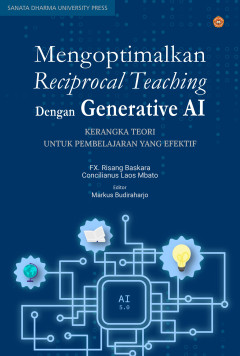
Mengoptimalkan Reciprocal Teaching dengan Generative AI
Dalam era digital yang semakin maju, pendidikan menghadapi tantangan dan peluang baru yang luar biasa. Buku ini ditulis oleh FX. Risang Baskara, Ph.D., dan Prof. Concilianus Laos Mbato, Ed.D., menyajikan panduan komprehensif tentang bagaimana pengajaran timbal balik (reciprocal teaching) dapat dioptimalkan menggunakan kecerdasan buatan generatif (generative AI).
- Edisi
- Cet. 1
- ISBN/ISSN
- 9786231430731
- Deskripsi Fisik
- xi, 274 hlm; 15,5 x 23 cm
- Judul Seri
- -
- No. Panggil
- 006.3 RIS m
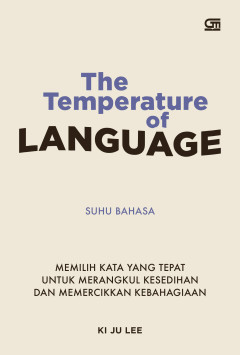
The Temperature of Language
Ucapan dan tulisan bisa memberikan kehangatan yang mampu merangkul kesedihan, bahkan memercikkan kebahagiaan. Dalam hidup sehari-hari, banyak orang meringankan beban dan rasa letihnya melalui perbincangan dengan teman. Tidak sedikit pula yang menemukan kedamaian dari kalimat-kalimat yang tertulis di buku.
- Edisi
- Cet. 1
- ISBN/ISSN
- 9786020651804
- Deskripsi Fisik
- xii, 208 hlm; 13,5 x 20 cm
- Judul Seri
- -
- No. Panggil
- 401.4 LEE t

Mitologi Dunia Kuno: Menguak asal-usul, hakikat, dan makna tersirat di balik …
Dipadukan dengan studi mutakhir lintas ilmu, seperti filsafat, sejarah, sosiologi, antropologi, bahasa, sastra, seni, psikologi, dan religi, buku ini akan menguak secara mendalam bagaimana asal-usul, hakikat, dan pesan tersirat di balik kisah-kisah mitologis bangsa-bangsa kuno di dunia.
- Edisi
- -
- ISBN/ISSN
- 9786232202191
- Deskripsi Fisik
- 360 hlm; 15 x 23 cm
- Judul Seri
- -
- No. Panggil
- 398.2 KAR m

From Idea To Action
Banyak orang memiliki ide bisnis kreatif, tetapi tidak semua berhasil mewujudkannya menjadi sebuah bisnis. Berbagai faktor dapat menghambat terwujudnya ide kreatif menjadi bisnis nyata. Beberapa diantaranya adalah kurangnya relevansi ide dengan kebutuhan pasar. Buku ini hadir sebagai panduan praktis bagi siapa saja yang ingin mewujudkan ide kreatif menjadi bisnis nyata yang potensial melalui pr…
- Edisi
- -
- ISBN/ISSN
- 9786230070839
- Deskripsi Fisik
- 103 hlm; 19 x 24 cm
- Judul Seri
- -
- No. Panggil
- 658.11 WUL f

21 Pelajaran untuk Abad ke-21
Dalam dua puluh satu bab yang provokatif sekaligus mendalam, Harari mengembangkan gagasan-gagasan yang dijelajahinya di buku-bukunya terdahulu, mengurai isu-isu politik, teknologi, sosial, dan eksistensial sambil memberi saran bagaimana menghadapi masa depan yang mungkin sama sekali berbeda.
- Edisi
- -
- ISBN/ISSN
- 9786020618487
- Deskripsi Fisik
- 357 hlm; 15 x 23 cm
- Judul Seri
- -
- No. Panggil
- 909.82

Sistem Informasi Akuntansi
Topik yang dicakup dalam buku teks ini memberikan mahasiswa sistem informasi dengan pemahaman yang solid akan sistem pemrosesan transaksi yang kemudian dapat mereka buat berdasarkan studi mendalam pada topik-topik khusus seperti database, penyimpanan dan pengumpulan data, jaringan, analisis dan desain sistem, keamanan komputer, dan pengendalian sistem informasi. Perubahan dalam edisi ketigabela…
- Edisi
- Ed. 13, Cet. 8
- ISBN/ISSN
- 9789790615281
- Deskripsi Fisik
- xxii, 534 hlm; 21 x 28 cm
- Judul Seri
- -
- No. Panggil
- 657 ROM s

The Golden Road: Sejarah yang terlupakan bagaimana peradaban India kuno menye…
Dalam buku ini, William Darlymple menyoroti posisi India yang sering terlupakan sebagai jantung Eurasia Kuno. Untuk pertama kalinya, ia memberi nama pada penyebaran ide-ide India yang mengubah dunia ini. Dari kuil Hindu terbesar di dunia di Angkor Wat hingga Buddhisme Tiongkok, dari perdagangan yang membantu mendanai Kekaisaran Romawi hingga penciptaan angka yang kita gunakan hingga saat ini (t…
- Edisi
- -
- ISBN/ISSN
- 9786232202160
- Deskripsi Fisik
- 544 hlm; 15 x 23 cm
- Judul Seri
- -
- No. Panggil
- 954 DAL t
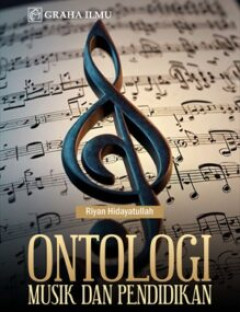
Ontologi Musik dan Pendidikan
Buku ini mengeksplorasi hubungan antara musik dan pendidikan melalui pendekatan ontologis, membahas keberadaan dan esensi musik sebagai bagian penting dalam pembelajaran manusia. Istilah ontologi sering digunakan dalam filsafat untuk memahami sifat dasar realitas dan eksistensi. Dalam ilmu sosial, ontologi digunakan untuk menjelaskan bagaimana konsep-konsep sosial dikonstruksikan dan dipahami.
- Edisi
- -
- ISBN/ISSN
- 9786233765817
- Deskripsi Fisik
- viii + 94 hlm; 17 x 24 cm
- Judul Seri
- -
- No. Panggil
- 780.72 RIY o

Potensi Tanaman sebagai Pewarna Alamai untuk Ecoprint
Keanekaragaman tumbuhan Indonesia berpeluang untuk dikembangkan sebagai bahan pewarna alami dalam pembuatan ecoprint sebagai upaya konservasi. Ecoprint merupakan teknik memberi pola pada kain menggunakan bahan alami dengan motif dan warna berasal dari daun, bunga, atau bagian dari tanaman di sekitar kita, sehingga motif kain khas, unik, dan ekslusif dengan pola yang berbeda.
- Edisi
- -
- ISBN/ISSN
- 9786233767200
- Deskripsi Fisik
- 86 hlm; 17 x 24 cm
- Judul Seri
- -
- No. Panggil
- 667 NUN p
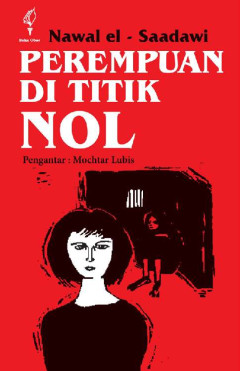
Perempuan Di Titik Nol
Buku ini berisi kisah nyata dan ditulis oleh Nawal El-Saaawi aktivis feminis terkemuka Mesir, mengisahkan Firdaus -- seorang perempuan yang menanti eksekusi mati karena membunuh germo. Bukannya gentas, Firdaus justru menyambut kematian dengan kepala tegak, menolak grasi, dan memilihnya sebagai satu-satunya jalan menuju kebebasan sejati
- Edisi
- -
- ISBN/ISSN
- 9786024334383
- Deskripsi Fisik
- xxviii + 210 hlm; 11 x 17 cm
- Judul Seri
- -
- No. Panggil
- 893 NAW p
Manajemen Mutu dan Kepemimpinan Lembaga Pendidikan
Di era disrupsi digital, VUCA, ChatGPT ini hampir tidak ada lagi sesuatu yang dapat diharapkan tetap. Buku ini mendukung Lembaga Pendidikan siap menghadapi aneka perubahan dahsyat tak terduga, dengan dikelola secara benar berbasis riset yang kredibel, sehingga terus melakukan transformasi dengan praktis manajemen yang berorientasi mutu menyeluruh : TQM dan ISO yang intinya perbaikan berkelanjutan.
- Edisi
- -
- ISBN/ISSN
- 9786231430366
- Deskripsi Fisik
- 183 hlm; 15.5 x 23cm
- Judul Seri
- -
- No. Panggil
- 373 IGN m
Ignatius Loyola : Pendiri Serikat Jesus
Buku ini merupakan buku biografi St. Ignatius Loyola yang ringkas. Dibandingkan dengan buku-buku riwayat St. Ignatius Loyola yang terbit sebelumnya, buku ini dapat dikatakan sebagai hasil usaha penuturan kembali riwayat hidup tokoh kita dalam gaya bahasa yang lugas, terus terang, hangat dan lembut. Dengan usahanya ini, pengarang bermaksud menghadirkan biografi lengkap tokoh saksi Allah yang dap…
- Edisi
- -
- ISBN/ISSN
- 9789791088343
- Deskripsi Fisik
- 377 hlm; 17.5 x 25 cm
- Judul Seri
- -
- No. Panggil
- 922.1 DED i
Menjadi Indonesia
Perjalanan Indonesia sebagai sebuah bangsa adalah proses jatuh bangun di dalam pusaran sejarah. Penelusuran sejarahnya menjadi penting supaya orang tidak terpenjara di dalam imaginasi sempit tentang Indonesia hari ini. Dengan imaginasi yang luas, masyarakat Indonesia akan dibantu untuk mengenal dirinya sebagai pribadi yang terbentuk oleh dinamika panjang. Dalam penelusuran buku ini, Indonesia d…
- Edisi
- -
- ISBN/ISSN
- 9786231430779
- Deskripsi Fisik
- 190 hlm; 15.5 x 23 cm
- Judul Seri
- -
- No. Panggil
- 201.5 MAR m
Merawat Bumi : Rumah Kita Bersama
Buku ajar Merawat Bumi : Rumah Kita Bersama ditulis dan disusun dalam sebuah pendekatan terpadu antara ilmu, etika, dan spiritualitas. Buku ajar ini dikemas sedemikian rupa sehingga pembelajar diajak memasuki setiap topik dari pemahaman tingkat empiris serta terukur ke pemahaman nilai-nilai serta kearifan yang lebih luas, mendalam, dan sulit diukur. Dibutuhkan selain daya nalar juga daya imagin…
- Edisi
- -
- ISBN/ISSN
- 9786236103159
- Deskripsi Fisik
- 284 hlm; 15.5 x 23 cm
- Judul Seri
- -
- No. Panggil
- 570 PAU m

Psikologi Olahraga: Latihan Keterampilan Mental dalam Olahraga Kompetitif
Buku ini mengungkap beberapa teknik atau metode latihan keterampilan mental yang harus dikuasai oleh atlet, agar atlet mampu mengatasi masalah-masalah emosi dan mental lainnya. Teknik atau metode latihan keterampilan mental tersebut adalah: "motivasi, kesadaran diri (self awareness), goal-setting, self confidence, relaksasi,
- Edisi
- -
- ISBN/ISSN
- 9789796921478
- Deskripsi Fisik
- 162 hlm; 15,5 c 23 cm
- Judul Seri
- -
- No. Panggil
- 796 KOM p
 Karya Umum
Karya Umum  Filsafat
Filsafat  Agama
Agama  Ilmu-ilmu Sosial
Ilmu-ilmu Sosial  Bahasa
Bahasa  Ilmu-ilmu Murni
Ilmu-ilmu Murni  Ilmu-ilmu Terapan
Ilmu-ilmu Terapan  Kesenian, Hiburan, dan Olahraga
Kesenian, Hiburan, dan Olahraga  Kesusastraan
Kesusastraan  Geografi dan Sejarah
Geografi dan Sejarah